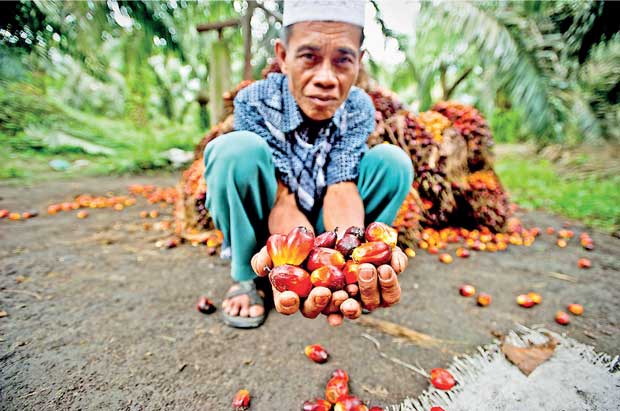04 Jan 2018 - {{hitsCtrl.values.hits}}

 Palm oil has gained notoriety for its links to tropical deforestation, biodiversity loss, greenhouse gas emissions, disturbance of carbon-rich peat land, exploitation of workers and land grabs.
Palm oil has gained notoriety for its links to tropical deforestation, biodiversity loss, greenhouse gas emissions, disturbance of carbon-rich peat land, exploitation of workers and land grabs.
Despite various non-governmental organisation (NGO) campaigns against palm oil since 1997, it’s principal producers and exporters (Malaysia and Indonesia) had previously been reluctant to do more to regulate its production.
Change is now coming to the industry and in two phases. Both involve transnational private standards jointly initiated by transnational NGOs and corporations. These standards outline permissible production practices through a set of benchmarks, best practices and rules all aimed at reducing or ending the environmental and social damage arising from palm oil production.
The first phase began with the establishment of the multi-stakeholder Roundtable on Sustainable Palm Oil (the Roundtable) in 2004. Despite unveiling a comprehensive certification scheme encompassing strong, clearly defined environmental and social standards in 2007, Roundtable certification was a limited instrument of reform.
Voluntary governance schemes like the Roundtable work through the market by using downstream corporate buyers’ demand for sustainably produced items to incentivise upstream producers to produce more sustainably. Whether production practices change depends on the strength of these market incentives and signals, their unimpeded transmission along the supply chain as well as the capacity of private standards to reinforce and amplify those incentives and signals. The Roundtable faced many constraints in this regard.
Aside from internal weaknesses in monitoring, auditing and enforcement, the Roundtable had to deal with fragmented supply chains. Mid-sized and even larger growers and smallholders had limited direct exposure to ‘green’ buyers located in Western markets and thus had little incentive to adopt certification. Such growers even managed to sell their unsustainably produced output to Roundtable-certified members. With ‘non-green’ markets such as China and India becoming major palm oil buyers, there was also little support from the Malaysian and Indonesian governments for private standards that they believed would constrain output expansion, burden growers and undermine smallholder livelihoods.
A second phase of change came with the ‘No Deforestation’ movement that took off in 2013. Roundtable critics, including some of its own members, launched the Palm Oil Innovation Group in 2013 backing stronger standards proscribing deforestation, the use of peat soil and social exploitation beyond prevailing Roundtable standards on these issues. This new ‘No Deforestation, Peat, Exploitation’ (NDPE) standard is not a certification scheme but it provides benchmark standards that individual corporations can adopt to demonstrate responsible sourcing practices.
Although this movement had begun in 2010 among consumer goods manufacturers, it was the Asian agribusiness giant Wilmar’s ‘No Deforestation’ pledge in December 2013 that had far-reaching consequences because of Wilmar’s preeminent position in the production of palm oil worldwide. Commitments from other Asian palm oil traders and processors to similarly source NDPE palm oil from their own operations and from external suppliers led to engagement in NDPE standards by growers and smallholders previously shielded from sustainability requirements. Close to 60 percent of global palm oil trade is said to be bound by the NDPE norm.
The ‘No Deforestation’ movement catalysed change in the industry. The crucial development was the consolidation of ‘supply chain traceability’ as a key industry norm that required detailed verification of the source of the purchased palm oil right down to the smallest grower.
Traceability involves three processes, namely: Surveillance of supply chain actors, evaluation of responsible behaviour as well as education and training. These ensure demand pressure from buyers reaches growers and binds them to sustainable supply chains. NGOs are key players in surveillance, evaluation, knowledge transfer and smallholder extension.
Importantly, the Palm Oil Innovation Group and NDPE galvanised the Roundtable to address its internal weaknesses, work towards NDPE standards and develop strategies to transform emerging markets into markets for sustainable palm oil. While shifts on the ground are occurring, they are limited to cultivation sites linked to plantation multinationals through these new sustainable supply chains.
These developments have triggered noteworthy shifts in official policies. Sub-national authorities of South Sumatra province and Seruyan regency in Indonesia as well as the state of Sabah in Malaysia have implemented jurisdictional certification measures which require Roundtable certification for all palm oil produced in these jurisdictions. The Malaysian and Indonesian central governments are also doing their part by developing mandatory national certification schemes. Although these are weaker than private sustainability standards, the national schemes are making sustainability the mainstream in national discourses and policies. In China, firms and industry bodies are paying attention to sustainable palm oil.
What policy lessons can we draw from these developments?
First, private governance can drive reform but industry-wide change cannot happen overnight. Importantly though, the private governance experience shows that small farmers can be incentivised to adopt strong sustainability standards through technical and financial assistance. This should reassure governments that are concerned with the burden private sustainability standards will place on smallholders.
Second, banning palm oil products and imports is not a solution. There is simply no guarantee that forests will remain protected and that endangered animals will be saved even if the ‘no palm oil’ campaigns succeed in driving down global demand for palm oil or halting production. It would be more constructive to insist on sustainable palm oil, for which there are already strong private standards.
Finally, producers and governments that are still reluctant to commit to stronger sustainability standards must realise that they cannot turn the clock back and should work to regain international credibility and avoid situations like the proposed European ban on imports of palm oil for biofuel.
(Helen E.S. Nesadurai is Professor of International Political Economy at Monash University, Malaysia)
27 Nov 2024 4 minute ago
27 Nov 2024 17 minute ago
27 Nov 2024 19 minute ago
27 Nov 2024 36 minute ago
27 Nov 2024 1 hours ago